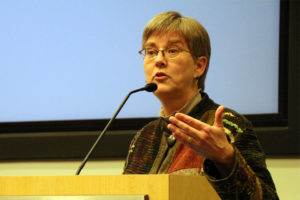 Progressive Voice is a weekly opinion column. The views and opinions expressed in the column are those of the individual authors and do not necessarily reflect the views of their organizations or ARLnow.com.
Progressive Voice is a weekly opinion column. The views and opinions expressed in the column are those of the individual authors and do not necessarily reflect the views of their organizations or ARLnow.com.
By Mary Hynes
In theory, everyone is for transparency in government – residents, politicians and public servants, businesses, non-profits, and government workers.
But what does transparency really mean for government operations and citizen interactions?
Is it the Board giving 48 or 72 hours of notice of its pending actions? Is it televising more government meetings? Is it posting information on the web or sending newsletters?
Recently, our current County Board Chair – someone who talks frequently about more transparency as a community solution – called the last minute, unadvertised (some would say non-transparent) announcement of a Blue Ribbon Panel the Board’s “biggest mistake.”
But she relieved the Board of any fault by saying “Our biggest mistake was thinking it would be a concept easily understood by the community.”
The Board did, at least, take a pause – until July 2016 — to hear directly from the community about their “idea”. I doubt the community will say that the task the Board laid out was clear or, in the scope of Arlington’s challenges, urgently necessary.
In evaluating the importance of transparency, let’s consider some other examples:
In 2009, the School Board hired a consultant to develop new school locations. That may have been transparent for school parents who were in the know about the process, but not for neighbors who, after repeated requests, couldn’t determine whether their needs were factored into a 50-year school location plan.
In August 2010, the School Board changed the rules on who could ride the bus in September without public discussion. That non-transparent action upended family plans all across Arlington with little time to develop alternatives.
In 2015, the County Board addressed the lack of success over three years in seeking publicly vetted solutions for the Reevesland property by directing the County Manager at a televised meeting without prior public notice to begin the legal process of creating a divided property. This was probably not transparent, though the public would have opportunities to weigh in on three additional public Board votes required before effecting changes at the property.
On the plus side, it’s good that the County Board is televising its works sessions. And it’s probably good that Planning and Transportation Commission meetings are being televised.
Both actions allow more people to watch, which can give a dedicated viewer a window into issues and choices and might spur an observer into broader participation in the process.
But for decisions that must stand the test of time — whether it’s the 50-year location of a new school or changes to bus routes that touch thousands of families – we need more than television.
Such decisions alter the very fabric of the community and they require broad resident participation and engagement. That special ingredient is what tends to make a decision a good one for the broad community.
When neighbors, government, community groups, and businesses sit and talk to each other about how to solve a real problem or address a complex challenge, the solution achieved is richer, more nuanced, better understood, and is more accessible even to those who couldn’t participate directly.
Such participation and the ability to explain is THE key ingredient our community has employed for many decades to create today’s great place.
Paying lip service to transparency for its own sake misses what really matters. Real community engagement isn’t more opportunities to watch or checking a box. Real community engagement – the roll-up-your sleeves hard work – is how great communities get great.
Today, more than ever, we need elected leaders who understand this on both the School Board and County Board. We need our County Manager and Superintendent to value the varied perspectives and needs that residents bring to the table.
We should commit to continuously developing strong civic engagement skills in County and School staffs so that our greatest resource — the talents and skills of those who choose to call Arlington home – are put to good use.
More than transparency for its own sake, we need greater opportunities for honest civic engagement. It’s our legacy and our future.
Mary Hynes served as an Arlington elected official for 20 years. In 12 years on the School Board she began the open office hours program and instituted a monthly newsletter and liaison meetings with PTA leaders. During eight years on the County Board, her PLACE initiative focused on civic engagement and the County’s commission structure. She instituted Open Door Mondays as an opportunity to meet a County Board member in a casual setting without an appointment. In 2015, she launched the citizen-led Community Facility Study that involved more than 200 residents.

